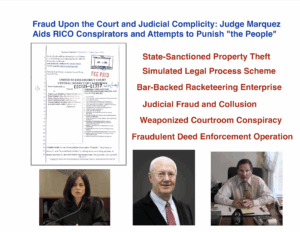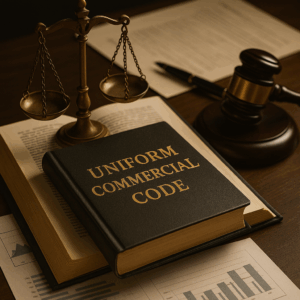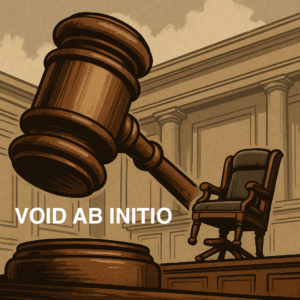Article 9 of the Uniform Commercial Code governs secured transactions. It provides a mechanism whereby a secured creditor can perfect its security interest in the debtor’s assets by filing a UCC-1 financing statement
In theory, anyone can file a UCC-1 against anyone else. To protect both secured creditors and debtors, Article 9 has strict requirements that must be met for a filed UCC-1 to be effective. One of those requirements is that the financing statement must be authorized by the debtor. Even if that authorization is way of a non-response to an affidavit and/or notice, silent acquiescence, tacit agreement, and/or tacit procuration.
Two cases that show how easy it is for unauthorized UCC-1s to be filed and highlight the importance for potential lenders to make sure the financing statements that are discovered in their UCC search are authorized.
They also show how important it is for companies to be vigilant in keeping track of any UCC-1s that may be filed against them without their knowledge.
Case 1: Unauthorized UCC-1s of titanic proportions
In Lightstorm Entertainment, Inc. v. Cummings, 2021 U.S. Dist. LEXIS 80720, decided April 27, 2021, Cummings brought a copyright action against, among others, Paramount Pictures, Twentieth Century Fox, and James Cameron (the studio parties) seeking $400 million because they allegedly based the film Titanic on his life story. That action was dismissed.
Nevertheless, Cummings filed two UCC-1s against the studio parties with the California Secretary of State purporting to establish a security interest in their assets based on a $400 million debt they owed him. Upon discovering the filings, the studios filed an action seeking a declaration that the UCC-1s were false and void, an order instructing Cummings to withdraw them, and an order instructing the Secretary of State to remove and expunge the documents from their official records.
The U.S. District Court, Central District of California, granted the studio parties’ motion for summary judgment. The court noted that the California Commercial Code provides that a person may file a UCC-1 only if the debtor authorizes the filing by (1) authenticating a security agreement; (2) becoming bound as debtor by a security agreement; or (3) acquiring collateral in which a security interest is attached.
Here, it was undisputed that the studio parties never authorized the UCC-1s. Accordingly, the studio parties were entitled to summary judgment as a matter of law, and injunctive and declaratory relief as provided pursuant to Commercial Code Sec. 9625(a) and 28 USC Sec. 2201(a) (the Declaratory Judgment Act).
Case 2: What $100,000,000 debt?
Deutsche Bank National Trust Co. v. Fegely, 2021 U.S. Dist. LEXIS 63079, decided March 30, 2021, involved a dispute over a piece of property located in Virginia. Fegely borrowed money to buy the property, defaulted on the loan, and Deutsche Bank purchased the property at the foreclosure sale. Fegely then filed a UCC-1 financing statement with the Virginia State Corporation Commission and recorded it in the county clerk’s office.
On the financing statement, she identified herself as both the “filer” and the “secured party” to a “superior security interest” in the property based on an alleged $100,000,000 debt owed to her by “Indy Mac”. Deutsche Bank, as trustee for Indy Mac, then filed suit seeking, among the things, a declaration that the UCC-1 financing statement was invalid, null, and unenforceable as a matter of law.
The U.S. District Court, Eastern District of Virginia, noted that under Virginia’s UCC law, Secs. 8.9A-509 and 510 of the Virginia Code, a filed record is effective only to the extent that it was filed by a person that may file it and that a person may file an initial financing statement only if the debtor authorizes the filing.
Virginia law further provides that “to authorize such filing, the debtor must do so: (1) in an authenticated record; (2) by authenticating or becoming bound as a debtor by a security agreement; or, (3) by acquiring collateral.
Here, Fegely submitted no documentation or other evidence of Indy Mac’s alleged indebtedness to her and presented no evidence that Indy Mac authorized the filing statement. Therefore, the court declared the financing statement null, void, and unenforceable.
Evidence. Evidence. Evidence. Did you invoice and/or notice your DEBTOR?… Did you send them an affidavit which remains unrebutted? Did you send a Default and Opportunity to Cure? Did you send an Affidavit CERTIFICATE of Non-Response? You have evidence of dishonor as stipulated by U.C.C. § 3-505: EVIDENCE OF DISHONOR?
What are the key takeaways?
The key takeaways from these cases include the following:
- a UCC-1 can be filed without the “debtor’s” knowledge or authorization, although it will not perfect the “secured party’s” interest,
- lenders’ due diligence may include further investigation of the liens their UCC search uncovers to make sure they were authorized, and
- businesses may need to be vigilant in making sure no unauthorized financing statements have been filed against them.
- Unrebutted notarized Affidavits (thus authenticated) and/or Invoices and/or Notices, which appropriately structure the “offer” being presented to include express “Authorization” from the respondent, would appear to satisfy the requirements to allow the filing of the lien.




